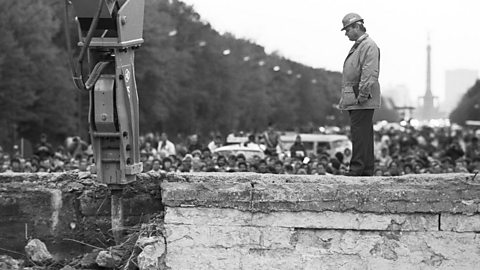Impact of Gorbachevãs Reforms in Eastern Europe
The increased freedom and openness in the USSRUnion of Soviet Socialist Republics - collection of states, also known as the Soviet Union. during the Gorbachev years encouraged similar changes across Eastern Europe throughout 1989.
- Hungary: Following years of disillusionment with communismA classless society where all property is owned publicly., things began to change in Hungary. Janos Kadar was replaced as leader of the Communist Party and there were discussions with other political parties in ãRound Tableã democratic talks. Hungarians began to dismantle the barbed wire barriers along its border with Austria. The Communist Party renamed itself the socialistSomeone who believes that society should be classless and that all property and wealth should be owned by the whole community and not by individuals. Party in October 1989 and democraticA system of government that allows people to have a vote. elections took place the next year.
- Poland: After years of protest against communism, led by the Solidarity Trade Union, free elections in Poland in June 1989 brought the Solidarity leader, Lech Walesa, to power
- German Democratic Republic: East Germans had observed the events in neighbouring Eastern Bloc countries with great interest. People started to protest against the hard-line government of Erich Honecker. Honecker ordered troops to fire on demonstrators but the troops refused to shoot at their compatriots. Gorbachev refused to send Soviet troops to shore up Honeckerãs regime. The reforms in Hungary meant that many East Germans were making their way to Hungary, and from there to West Germany. The East German authorities were forced to allow people to travel more freely in order to cope with this flow of migrants, and eventually, on 9 November 1989, East Germans were told they could cross the border into West Berlin. In dramatic scenes, the Berlin Wall was torn down by demonstrators. Germany was reunited in 1990. The fall of the Wall was massively symbolic of the end of the Cold War. As one Berliner spray-painted on the Wall: ãOnly today is the war really over.ã The fall of the Wall speeded up the pace of change across Eastern Europe.
- Czechoslovakia: There were anti-communist demonstrations in Czechoslovakia in 1989, and it opened its borders with the West. The playwright, Vaclav Havel, was democratically elected President in 1990.
- Romania: At the end of 1989, a short, bloody revolution overthrew the communist leader of Romania, Nicolae Ceausesecu, who, together with his wife, was executed on Christmas Day.
- Soviet Republics: In 1990 and 1991, one by one the former Soviet Republics of the USSR (Lithuania, Latvia, Estonia, Georgia) declared themselves independent.

In August 1991, some hard-line communists attempted to stage a military coup in Moscow, arresting Gorbachev and holding him under house arrest at his dachaHoliday home, or second home, of wealthy Soviets. in the CrimeaArea of land in the south of Ukraine. Where Gorbachev was kept under house arrest during the attempted coup of 1991.. There was huge popular opposition to the coup which collapsed, and Gorbachev was released. This was the coup de graceAn attempt to overthrow, or takeover, a country and replace a leader without an election. for the USSR and by the end of 1991 it had been dissolved. Russia declared itself a republic in 1991 and elected Boris Yeltsin at its leader.